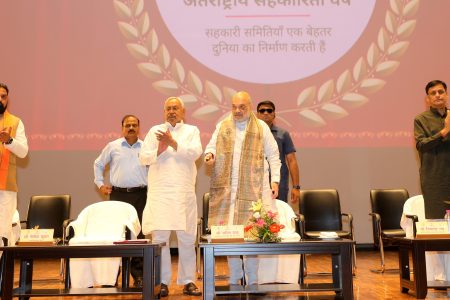Patna: Union Home Minister and Minister of Cooperation Amit Shah today inaugurated and laid the foundation stone for various Central and State Government projects worth over ₹800 crore in Patna, Bihar. The event was attended by Bihar Chief Minister Nitish Kumar and Union Minister of State for Home Affairs Nityanand Rai.
Addressing the gathering, Amit Shah emphasized that the Modi government has undertaken significant initiatives for the welfare of the poor over the last decade. He highlighted that under Prime Minister Narendra Modi’s leadership, 80 crore people receive 5 kg of free food grains per person per month, 4 crore houses have been provided to the underprivileged, 11 crore gas connections have been distributed, over 12 crore toilets have been built, and free medical treatment of up to ₹5 lakh has been ensured. He criticized previous opposition governments for neglecting these fundamental needs, asserting that the Modi government has ensured access to housing, electricity, gas, drinking water, medicines, and sanitation for millions.
Speaking on the importance of the cooperative sector, Shah pointed out that the Modi government, for the first time in independent India’s history, established the Ministry of Cooperation to bolster rural economies, benefiting farmers, women, dairy producers, and fisheries. He accused past governments of failing to support the cooperative sector in Bihar, which led to the closure of several industries, including sugar mills. Once a leader in sugar production, Bihar’s share has plummeted due to years of neglect. He assured that the central government is committed to reviving all 30 closed sugar mills in the state and strengthening Primary Agricultural Credit Societies (PACS) to empower farmers.
Highlighting Bihar’s potential in agriculture, Shah mentioned that the state leads in the production of litchi, mushroom, and makhana, ranks second in maize production, third in lentils and honey, fifth in moong and sugarcane, and sixth in wheat and rice. He announced that the Makhana Board has been established in Bihar to promote the Makhana industry and that a ₹1,000 crore investment will be made to revive the Maize Research Centre. He also noted that the government has ensured the procurement of maize, pulses, wheat, and rice at the Minimum Support Price (MSP) to benefit farmers.
Discussing infrastructure development, Shah stated that Bihar has received ₹4 lakh crore for roads and bridges, ₹1 lakh crore for railway projects, and ₹2,000 crore for airport development. He highlighted that seven major bridges are being constructed with ₹8,000 crore, while a 5,000-kilometer railway line is being developed with an investment of ₹31,000 crore, including the launch of Bihar’s first-ever farmers’ train. He also noted that 766 other development projects, including the revival of the Barauni fertilizer plant, are being implemented with the support of the central government.
During the event, several key projects were inaugurated or had their foundation stones laid. These included the development of food storage capacity in 25 PACS under the world’s largest food storage scheme at a cost of ₹83.16 crore, the construction of 133 police buildings costing ₹181.14 crore, and three road projects under the Ministry of Road Transport and Highways worth ₹109.16 crore. Additionally, a hostel at Deep Narayan Singh Regional Cooperative Management Institute in Patna, built at a cost of ₹27.29 crore, was inaugurated, along with a Makhana processing and marketing center constructed for ₹46 lakh under the Integrated Cooperative Development Project. A total of 11 new warehouses costing ₹2.27 crore were also inaugurated, while five drinking water supply schemes worth ₹421.41 crore were launched under the AMRUT-1 project of the Urban Housing and Development Department.
Amit Shah took a sharp swipe at the opposition, stating that Bihar suffered from lawlessness, kidnappings, extortion, and corruption between 1990 and 2005, which led to what he termed “Jungle Raj.” He accused previous governments of failing to maintain law and order, alleging that their tenure was marked by caste massacres, government-sponsored corruption, and scandals such as the fodder scam. He assured that the Modi government’s 20-year track record of development has transformed Bihar, ending the era of instability and underdevelopment.

